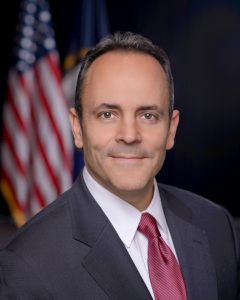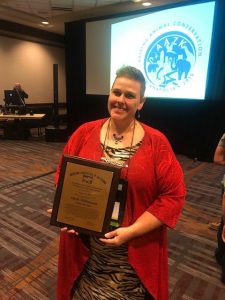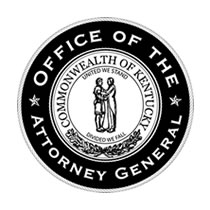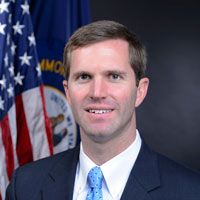 Gov. Matt Bevin released the following statement regarding the Kentucky Supreme Court’s unanimous ruling today that Attorney General Andy Beshear broke the law:
Gov. Matt Bevin released the following statement regarding the Kentucky Supreme Court’s unanimous ruling today that Attorney General Andy Beshear broke the law:
“The Supreme Court today unanimously held that Andy Beshear broke the law in awarding outrageous, uncapped state legal contracts to his friends and campaign donors. As Attorney General, Andy Beshear claimed that he is above the law and attempted to put his campaign donors ahead of the interest of Kentuckians in ongoing cases with opioid manufacturers. If allowed to continue, that practice could take millions of dollars away from Kentuckians who need it most and put it in the pockets of Andy’s largest campaign contributors. With today’s ruling, Andy Beshear can no longer engage in this type of soft corruption and will be subject to the same procurement laws and financial oversight as other state agencies. If Andy Beshear feels that he and his office are not competent to fight against the opioid manufacturers, he can still hire outside counsel, but he must do it legally.”
To view today’s 7-0 ruling by the Kentucky Supreme Court, click here.
 Jefferson County Attorney Mike O’Connell announced a new policy objective Wednesday to generally not prosecute possession of marijuana (“POM”) cases involving one ounce of marijuana or less when the possession charge is the only charge or the most serious charge against the individual.
Jefferson County Attorney Mike O’Connell announced a new policy objective Wednesday to generally not prosecute possession of marijuana (“POM”) cases involving one ounce of marijuana or less when the possession charge is the only charge or the most serious charge against the individual.
“A prosecutor has the responsibility of a minister of justice and not simply that of an advocate,” O’Connell said, quoting the commentary on Rule 3.8 from The American Bar Association’s Model Rules of Professional Conduct and, its counterpart, the Kentucky Bar Association’s Rules of Professional Conduct. “As your County Attorney, I take that admonition seriously and that is why I must now act in regard to possession of marijuana cases.”
O’Connell cited the need for fair and equal enforcement of the laws and finding the best use of his office’s limited resources in exercising his discretion as a prosecutor.
“We will now devote even more time and attention to the serious, and potentially deadly, crimes involving guns, domestic violence and DUI,” O’Connell said.
A 2013 study found that black and white Americans use marijuana at the same rates, but black people are nearly four times more likely to be arrested for POM than whites. Earlier this year, The Courier Journal analyzed Louisville Metro Police Department data from 2010 to 2017 and determined that similar or worse disparities occurred locally when marijuana was the most serious charge cited.
“Its origin is likely not intentional or malicious, but that does not change the end result,” O’Connell said. “For me to truly be a minister of justice, I cannot sit idly by when communities of color are treated differently.”
O’Connell also highlighted KRS 218A.276, a state statute last amended in 2012, that allows an individual to have POM charges completely voided from their record—at potential no cost to the defendant—after 60 days.
“No one should see their future diminished over a charge like this, especially when there are available legal tools to wipe this from a person’s criminal history,” O’Connell said.
O’Connell researched different approaches that communities across the nation have taken with POM cases and developed his plan in recent months. In addition to charges involving possession of marijuana (KRS 218A.1422), the Jefferson County Attorney’s Office will also no longer prosecute illegal possession of drug paraphernalia (KRS 218A.500) in the following limited circumstance: when the item possessed is clearly only used for the inhalation/ingestion of marijuana.
The new objective does not apply to persons under the age of 21, and does not include cases involving any indicators of trafficking in marijuana; cultivating marijuana; driving while under the influence of marijuana; public display, use, or consumption of marijuana; or public intoxication as a result of marijuana.
Joining O’Connell for the announcement were leaders from the Kentucky’s social and racial justice community, including Raoul Cunningham of the NAACP, Sadiqa Reynolds of the Louisville Urban League, Michael Aldridge of the ACLU of Kentucky and Reverend Charles Elliott Jr. of King Solomon Missionary Baptist Church.
“These disparities and effects are not the problem of any one part of government, any one profession or any one people,” O’Connell said. “This is a problem that belongs to us all. In my role as Jefferson County Attorney, I can do more to develop reforms that avoid needlessly bringing people into the justice system. I choose to act.”
 Louisville Zoo Keeper Alexis Williamson has been awarded the Lutz Ruhe Professional of the Year Award by the American Association of Zoo Keepers (AAZK). Williamson, who works in Gorilla Forest, was honored at the association’s national conference on Tuesday, Aug. 20 in Indianapolis.
Louisville Zoo Keeper Alexis Williamson has been awarded the Lutz Ruhe Professional of the Year Award by the American Association of Zoo Keepers (AAZK). Williamson, who works in Gorilla Forest, was honored at the association’s national conference on Tuesday, Aug. 20 in Indianapolis.
The Lutz Ruhe Professional of the Year award recognizes outstanding commitment to professionalism. Williamson’s conservation efforts were specifically noted which include contributions to Plinko for a Porpoise and the Zoo’s flagship Black-Footed Ferret Conservation Center as well as generational record contributions for the gorillas housed at the Louisville Zoo. In addition, she has been a vital part of the formation of the Animal Enrichment Tree Program at the Zoo while serving on the enrichment committee. Williamson has been president of the AAZK chapter at the Zoo for 14 years.
See some outstanding artists at the 6th annual Waveland Art Fair Sept. 7-8 at Waveland State Historic Site in Lexington.
Guests can browse and shop with Kentucky artist artwork both days. Then take a walk through the historic home, where costumed staff will greet you. Enjoy lunch from Forage or Rise Up Pizza food trucks and special Kentucky fare from West 6th and Chrisman Mills Winery wine tastings.
The fair will be open Sept. 7 from 10 a.m. to 5 p.m. and on Sept. 8 from 11 a.m. to 5 p.m. Admission is $5 for adults and free for children under 12.
The Kentucky Arts Council will present a folk arts demonstration area and Perfoming Artist music stage, featuring traditional artists from all over the Commonwealth. Children’s activities from Living Arts and Science Center, Explorium and Girl Scouts will be offered throughout the event.
Kentucky folk artists demonstrating are:
- LaVon Van Williams, Lexington, woodcarver
- Art Mize, Lexington, luthier
- Donna Lamb, Lancaster, luthier
- Timmy Walden, Tompkinsville, marble maker
- Justin Roberts, Murray, willow furniture maker
Music on the Kentucky Folk Artists Stage
Saturday, Sept. 7
- Noon – Narrative stage interview with Lewis Lamb, Donna Lamb, LaVon Van Williams and Art Mize
- 1 p.m. – Cari Norris, Louisville
- 2 p.m. – The Partisans, Lexington
- 3 p.m. – Lewis and Donna Lamb, Lancaster, performance and old time jam
Sunday, Sept. 8
- Noon – Narrative stage interview with Timmy Walden and Justin Roberts
- 1 p.m. – A Girl Named Earl, Louisville
- 2 p.m. – Brett Ratliff with Nadia Ramlagan, Lexington
- 3 p.m. – Lewis and Donna Lamb, Lancaster, performance and old time jam
Each day the stage will open with a narrative stage, followed by two music performances, and end with a performance and open jam session hosted by Donna and Lewis Lamb. Art fair attendees will be encouraged to bring their stringed instruments and join in the old time music jam.
Waveland State Historic Site is located at 225 Waveland Museum Lane, near the intersection of Nicholasville Road and Man-O-War. For more information, call 859-272-3611.
 Attorney General Andy Beshear announced today that a Fayette circuit judge has agreed to unseal court documents that reveal data on how one opioid maker accounted for the majority of opioids in grams sold in Kentucky from 2006 to 2014.
Attorney General Andy Beshear announced today that a Fayette circuit judge has agreed to unseal court documents that reveal data on how one opioid maker accounted for the majority of opioids in grams sold in Kentucky from 2006 to 2014.
The new information allows Kentuckians to see how Pennsylvania-based pharmaceutical manufacturer Teva persuaded physicians to prescribe its drugs, Actiq and Fentora, to treat chronic pain despite the drugs being approved by the Federal Drug Administration (FDA) only for breakthrough pain in cancer patients.
Beshear said during eight years, Teva sold 28% of the total opioid grams in Kentucky, and over six years, sales representatives for Fentora visited and/or called Kentucky healthcare providers more than 3,000 times. Only about 150 of these visits were to actual cancer doctors.
“The actions by Teva directly contributed to the state’s addiction outbreak,” Beshear said. “In asking that these documents be unsealed, I wanted to make sure Kentuckians are able to see just how far this opioid manufacturer went to maximize its profits while preying on our loved ones.”
Previously redacted information in the complaint now available after Beshear’s motion includes:
- Teva internally tracked its sales representatives to ensure that prescribers absorbed their messages.
- In 2004, the FDA met with Teva over concerns of promoting its drug Actiq for off-label use. According to records of the meeting, the FDA told Teva “off-label promotion is illegal, with a drug with a risk profile like Actiq, raises significant public health concerns.”
- Teva targeted non-oncologists in order to boost its sales of Actiq and Fentora. Teva developed a research and publication plan to target doctors outside of the cancer-treating population. “This included focused promotional and educational efforts directed toward pain specialists in order to increase their prescribing of Actiq and Fentora.”
Beshear’s office filed a lawsuit against Teva in October 2018 for deceptively marketing its fentanyl-based drugs across the Commonwealth. At the time, Beshear’s office had access to the Drug Enforcement Agency (DEA) database, but was required to protect the information until that data was released in July as part of a federal opioid case in Ohio.
The DEA database – Automation of Reports and Consolidated Orders System (ARCOS) – tracked about 380 million opioid pill transactions between 2006 and 2012 in the U.S. According to the data, companies flooded Kentucky with more than 1.9 billion pills over a six-year period and Teva manufactured 690 million pills making it one of the top six manufacturers during that time.
Once the database was opened, Beshear’s office requested that the DEA consent to disclosing the information, to which it had no objection, and filed a motion in Fayette Circuit Court.
Beshear has also filed a motion to unseal redacted DEA data in the Mallinckrodt lawsuit, originally filed in July 2018 for allegations that the St. Louis pharmaceutical manufacturer reaped huge profits and falsely claimed its opioids could be taken in higher doses without disclosing the greater risk for addiction.
Last month, Beshear’s office won another fight in Kentucky’s battle with opioid companies by defeating the eighth straight motion to dismiss by an opioid manufacturer or distributor in Kentucky courts.
Beshear’s office transferred $1.5 million of opioid settlement funds to battle Kentucky’s drug epidemic this year adding needed resources for law enforcement and drug treatment. Starting the first statewide opioid disposal program, Beshear’s partnerships have helped communities eliminate more than 2.2 million opioids from Kentucky households.
To date, Beshear has sued nine opioid pharmaceutical and/or distributors, making him the most aggressive attorney general in the nation. Kentuckians can follow the progress of all his opioid cases here.
 Kids can get their hands on 18th century history at Fort Boonesborough State Park’s first Hands on History for Kids event Sept. 7-8.
Kids can get their hands on 18th century history at Fort Boonesborough State Park’s first Hands on History for Kids event Sept. 7-8.
This event allows children to learn about life in the 18th century. Hands on skills will include churning butter, grinding corn, baking ash cakes, carving on powder horns, carding and spinning and many other pioneer skills.
The displays will be available 9 a.m. to 5 p.m. both days and are free with paid fort admission. Admission is $8 for adults, $5 for children ages 6-12 and children under 6 are free.
There will also be a puppet show featuring Punch and Judy and a demonstration on falconry. The Fort Boonesborough Foundation will have concessions available throughout each day.
Fort Boonesborough State Park marks the site of a fort built by Daniel Boone and other settlers in 1775 along the Kentucky River. The state park near Richmond has a reconstructed fort, a campground, hiking trails, mini-golf, picnic shelters and a gift shop.
 Attorney General Andy Beshear announced today that his office is doubling down on recent, successful efforts with phone companies to stop scam calls by urging the Federal Communications Commission (FCC) to compel more phone companies to join the fight.
Attorney General Andy Beshear announced today that his office is doubling down on recent, successful efforts with phone companies to stop scam calls by urging the Federal Communications Commission (FCC) to compel more phone companies to join the fight.
Beshear joined a coalition of 51 attorneys general in sending comments to the FCC in support of requiring voice service providers to implement a caller ID authentication framework if they fail to implement the framework voluntarily by the end of 2019 and to provide free, default call-blocking programs to customers.
The comments follow a breakthrough announcement from Beshear, a bipartisan public-private coalition of 51 attorneys general and 12 phone companies last week who reached an agreement to work together to stop illegal and invasive scam calls.
“Working to stop illegal scam calls is a top priority for my office,” Beshear said. “To make sure every Kentuckian is protected, I want to see every phone service provider offer free call-blocking services and implement technology that can block scam calls. If companies won’t voluntarily provide these crucial services, they should be required to.”
In their comments to the FCC, the coalition of attorneys general states that phone service providers should be required to:
- Offer free, automatic call-blocking services to all customers. The call-blocking services should be based on reasonable analytics and should not block important calls, including emergency alerts or automated calls that customers have signed up for, like medical reminders or school notifications.
- Monitor network traffic to identify patterns consistent with scam calls and take action to cut off the calls or notify law enforcement.
- Implement caller ID call authentication technology, which will help ensure that telephone calls are originating from secure, verified numbers, not spoofed sources. The coalition supports the FCC’s proposal to take regulatory action against telecom companies that do not comply with this technology.
- Develop caller ID authentication to prevent robocalls to landline telephones. This is particularly urgent because the people defrauded by scam calls are often elderly Kentuckians who primarily use landline technology.
Attorneys general from all 50 states and Washington, D.C. have joined Beshear in signing these comments.
Since taking office, Beshear has worked on the state and federal level to encourage the implementation of new solutions to help stop scam calls.
Last year, Beshear urged the FCC to adopt rules that allow phone companies to use new technology to block illegal robocalls. In June, the FCC voted unanimously to let phone companies join the fight. Before this change, companies were required by law to complete known scam calls and now they can legally block them before they ever reach your phone.
Beshear has long supported the FCC’s actions to encourage and require service providers to implement a caller ID authentication framework. Some carriers are already helping by identifying a call as “scam likely” or “scam call.”
Earlier this year, Beshear’s office was also part of a national sweep with the Federal Trade Commission and other states that cracked down on nearly 100 illegal call operations. These operations were responsible for more than a billion illegal scam calls.
Kentuckians wanting to block scam calls to their phone should contact their phone carrier or internet service provider to ask about call-blocking technology, which can help stop many scam calls.
Kentuckians can avoid falling victim to scams by signing up to receive new and trending scam alerts from the Office of the Attorney General by texting the words KYOAG SCAM to GOV-311 or visiting ag.ky.gov/scams.
Beshear said Kentuckians should report scams to his office via an online complaint form or by calling 888-432-9257.
 Weather
Weather Traffic
Traffic @LouisvilleDispatch
@LouisvilleDispatch @LouisvilleDisp
@LouisvilleDisp Subscribe
Subscribe